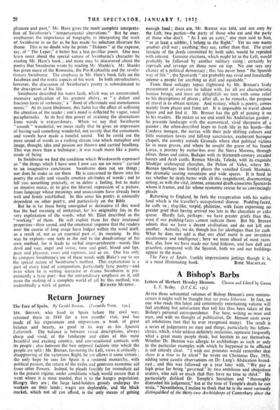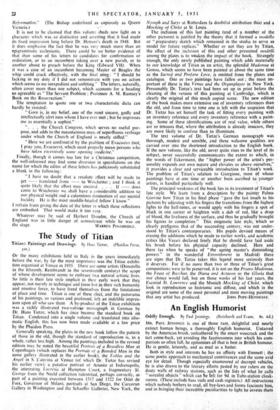A Bishop's Barbs
Letters of Herbert Hensley Henson. Chosen and Edited by Canon E. F. Braley. (S.P.G.K. 155.)
AFTER three substantial volumes of Bishop Henson's own reminis- cences it might well be thought that sat prata biberunt. In fact, no one who reads this latest and consistently entertaining volume will feel anything but satisfaction that toll has thus been taken of the Bishop's personal correspondence. For here, writing as man and man, and with no thought of publication, Dr. Henson casts away all inhibitions (not that he ever recognised many). The result is a series of judgements on men and things, particularly his fellow- clerics, which, while seldom definitely malicious, represent frequently what a great many people think, but hesitate to say themselves. Whether Dr. Henson was allergic to archbishops as such or only to the particular examples with which he happened to be afflicted is not entirely clear. " I wish our primates would remember that there is a time to be silent" he wrote on Christmas Day, 1936, adding some caustic observations on Dr. Lang's Abdication broad- cast ; and this was followed up a year later with, " We pay a high price for being ' governed ' by two ambitious and ubiquitous orators, who talk so much that they have no time to think." He particularly disliked Dr. Temple's Socialism and " thoroughly distrusted his judgement," but at the time of Temple's death he can write, " Nevertheless, I incline to think that he is the most variously distinguished of the thirty-two Archbishops of Canterbury since the
Reformation." (The Bishop underlined as copiously as Queen Victoria.) - It is not to be claimed that this volume sheds new light on a character which was so distinctive and arresting that it had made its fixed impression long before Dr. Henson's death in 1948. But it does emphasise the fact that he was very much more than an epigrammatic ecclesiastic. There could be no better evidence of that than some of his letters to candidates for confirmation or ordination, or to an incumbent taking over a new parish, or to another about to preach before the King (Edward VII). When it was a case of an incumbent becoming Master of Beagles the whip could crack effectively, with the final sting: " I should be lacking in my duty if I did not remonstrate with you on action which seems to me inexpedient and unfitting." The letters, naturally, often cover more than one subject, which accounts for a heading so agreeable as "The Servant Problem ; Professor A. M. Ramsey's Book on the Resurrection."
The temptation to quote one or two characteristic dicta can hardly be resisted: " Gore is, in my belief. one of the most sincere, godly and intellectually alert men whom 1 have es er met ; but he impresses me as essentially a sophist."
. . the Church Congress. which serves no useful pur- pose, and adds to the mountainous mass of superfluous verbiage under which the Church of England is nearly stifled."
" Here we are confronted by the problem of Evacuates (not, I pray you, Evacuees), which must properly mean persons who have taken excessively some opening medicine."
Finally, though it comes too late for a Christmas competition, the well-informed may find some diversion in speculations on the name for which the editor of these letters has judiciously substituted a blank in the following: " I have no doubt that a resolute effort will be made to get — translated from — to Winchester ; and I think it quite likely that the effort may succeed. . . . If — does come to Winchester we shall have a considerable addition to our physical weight and a calamitous diminution of our mental lucidity. He is the most muddle-headed fellow I know."
I refrain from giving the date of the letter in which these reflections are embodied. That would make it too easy.
Whatever may be said of Herbert Dunelm, the Church of England was in little danger of somnolence while he was on







































 Previous page
Previous page